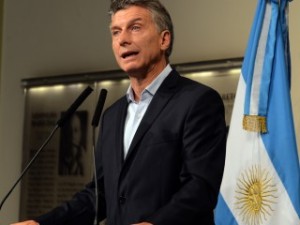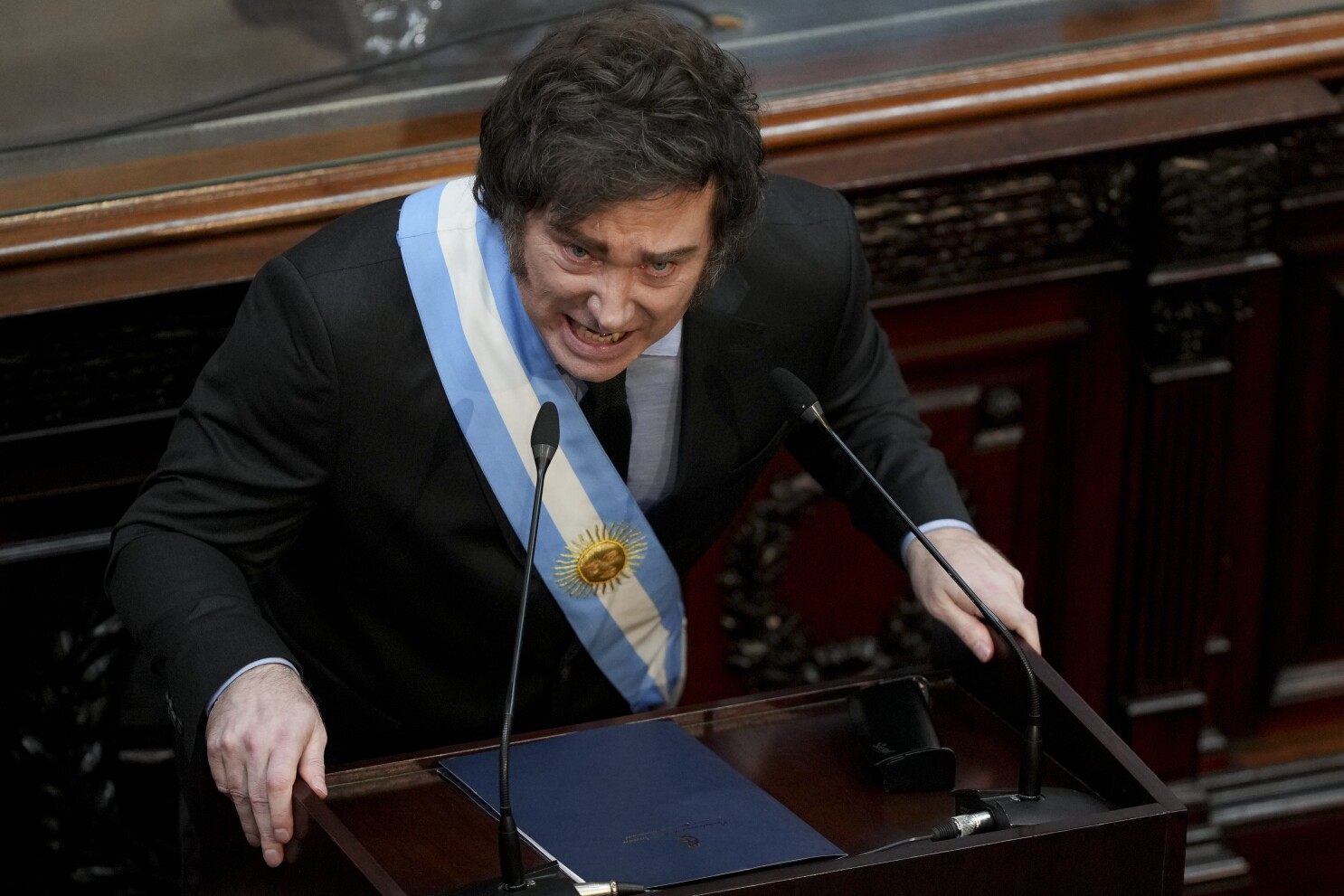 The first month of Mauricio Macri’s administration was intense. He made drastic economic changes, he began to form a new government characterized by the presence of men and women from multinational companies, and he emitted a series of decrees rather than calling on congress (where his party does not have a majority) to pass legislation in an extraordinary session. During Macri’s hundred-day honeymoon, he pushed through measures that were only possible because of the mmomentum of his triumph in the election of Nov. 22. A young political party–the PRO is only 15 years old—inaugurated a new government and started a novel and unprecedented political right.
The first month of Mauricio Macri’s administration was intense. He made drastic economic changes, he began to form a new government characterized by the presence of men and women from multinational companies, and he emitted a series of decrees rather than calling on congress (where his party does not have a majority) to pass legislation in an extraordinary session. During Macri’s hundred-day honeymoon, he pushed through measures that were only possible because of the mmomentum of his triumph in the election of Nov. 22. A young political party–the PRO is only 15 years old—inaugurated a new government and started a novel and unprecedented political right.
Macri, the uncontested leader of the PRO and the head of government of the City of Buenos Aires for the past eight years, took office as president on Dec. 10. The same day, María Eugenia Vidal took office in the Province of Buenos Aires and Horacio Rodríguez Larreta took office in the capital. Both are central figures to the party and they played important roles during the current president’s tenure as mayor of Buenos Aires.
Together, the city and the province make up almost 45% of the national electorate. It was predictable that PRO would win the city, but its victory in the province of Buenos Aires, many people say, tipped the scales in the presidential election.
When a week after taking office various regions of the country flooded due to intense rain, Vice President Gabriela Michetti tweeted that the SUMA Foundation would collect donations of mattresses, water and non-perishable food for those affected by the floods. It was a telling move. Although she now had access to a national budget and public services, she preferred to use non-governmental organizations.
The PRO arose from the private sector. It was born in the 2001 crisis, out of a series of non-governmental organizations (NGOs), foundations and think-tanks. The party still identifies with these organizations.
Before taking the presidency, the PRO presented its cabinet to the media in a laid-back meeting in a botanical garden. With a “chill” style, the new “team” posed for a photo. “Team” (equipo) is the word that the president uses for the group he calls “the best.” Most of the ministers and secretaries are graduates from private universities who have built their résumés in large businesses.
There are 300 posts that need to be filled in Argentina’s national government, among them ministers, secretaries and subsecretaries.[1] Building a new bureaucracy is a difficult task for anyone, but even more so for a party with a short history and a scarcity of cadres.
The most apparent pattern is that many of the new ministers are ex-CEOs from multinationals. The new cabinet has been called “CEOcracy.” Now, the public plays as a guest on their own court.
A few examples illustrate the point. The new minister of Agriculture, Ricardo Buryaile, is president of Confederaciones Rurales Argentinas and a member of the Mesa de Enlace. Both organizations were central to the management lock-out against the government of Cristina Fernández de Kirchner in 2008. The new president of the national airline, Isela Constantini, comes ______________________________________________________________________________
A popular term for Macri’s cabinet has arisen: the “CEOcracy.” Under this model, the public plays as the visiting team on its own court.
_____________________________________________________________________________
from General Motors; the Minister of Energy and Mining, José Aranguren, comes from Shell; the Minister of Labor, Miguel Puente, directed Human Resources for Techint; the Minister of Modernization, Andrés Ibarra, comes from the Socma Group of the Macri family.
The head of government, Marcos Peña, and the General Secretary of the Presidency, Fernando de Andreis, are young (under 40) and form part of the PRO’s inner circle. Both of them have been career politicians since the beginning and have accumulated experience in public service with the Macri government for almost a decade.
Changes in Political Economy
The macroeconomic policies that Macri announced in the first days of his presidency are structural and include price-hikes for essential public services, ending reserves for grain exporters, increasing foregn debt and devaluating the currency, which led to a foreseeable spike in inflation.
Actually, increasing prices have been a problem in Argentina for years, but the problem became more serious recently, when, before taking office, the Minister of the Economy Alfonso Prat Gay announced that he would devaluate the currency. After taking office, Prat Gay held a press conference that the entire country watched as if it were Cadena Nacional. He announced that he would unpeg the Argentine peso from the dollar. The Kirchner governments had adoptedthe currency peg to prevent capital flight, and the opposition converted it into a national cause.
“What is the exchange rate going to be tomorrow?” a journalist asked during the conference.
“I wish I knew,” responded the minister, smiling.
The message was clear: free markets, self-regulation. The invisible hand will take care of everything. But, in reality, it wasn’t like that: the government had taken a series of measures to stop the dollar from shooting up the next day. The dollar ended up being sold for a little more than 13 pesos, less than the value of the dollar on the black market, which up until then had been almost 4 points higher than the official value.
One of the main policies was to eliminate withholding taxes on agricultural exports and to reduce taxes on soy exports by 5%. In return, agribusiness promised to release production that they had been accummulating. This is good news for producer-exporters: it is estimated that their earnings will increase by 30 billion pesos per year.
The commercial liberalization not only promotes exports, but also opens the country up to imports–a model opposite that of Kirchnerism. Wages will lose value due to increases in internal prices for exportable products. The government’s promise is that the flood of imports will compensate for inflation. Argentina is losing, in the medium and long term, its national industry.
One of the most controversial measures during Kirchnerism was the chaotic intervention of the INDEC, the official institute of statistics that measures inflation, among other things. Macri, using the general chaos as an excuse, has announced that there will be no data for several months. This is a strategic rather than a technical decision, to cope with the turbulent times.
The PRO claims that the “shock” measures will lead to growth that will create jobs, and that their objective is “zero poverty.” They don’t explain how or with what.
This is one of PRO’s communication strategies. They also call the devaluation “the end of the peg” and inflation “the path to true prices.”
One of the measures that caused the most uproar in the first week of Macri’s tenure had to do directly with communication. The executive intervened in AFSCA, the agency that enforces the Audiovisual Communications Law and modified that law by decree. The law, supported by grassroots organizations, was debated all across the country and approved by a plurality of social organizations. It grew out of a major effort of Kirchnerism to avoid media concentration. One of their chief rivals was the Clarín Group, which will now reap the benefits of Macri’s decree.
This was not the only measure that Macri imposed without calling an extraordinary session of a Congress he does not control. He tried to name two judges to complete the Supreme Court and to abolish the recently established penal code.
In his first month as president Macri also started a purge of various state agencies, just as he had done when he took office as head of government of the capital. Recently, he announced that every employment contract will be reviewed, and promised an end to paying for “political support with taxes.” The vice president fired 2,035 people in the Senate, and by eliminating AFSCA, left 90 unemployed.
According to Ignacio Cao and Maximiliano Rey, writing for Revista Anfibia, the contracts of 24,000 public employees and 11,000 bidding processes will be reviewed. But, they explain, “firing 10% of government employees wouldn’t lead to savings larger than 1% of the budget.”
The Difficult Political Road
Macri came in second in the first electoral round on Oct. 25 and eked out a close victory on Nov. 22 (he won by less than 700 thousand votes). The specific consequence is that he doesn’t control either house of Congress and that, when Congress begins session, he will need to make political alliances and will find it more and more difficult, at least rhetorically, to keep ruling by decree.
At the same time, as summer ends in Argentina, the new government will face the labor-management councils and the debate with the fractured world of organized labor.
Diego Gonzalez (gonzalezdiegofernandez@gmail.com) is a journalist in Buenos Aires. His blog is www.diegofgonzalez.blogspot.com. TW: @diegon2001. He is an analyst for the Americas Program https://www.americas.org/es/. Julia Muriel Dominzain is a journalist based in Buenos Aires.
Translation by Simon Schatzberg
[1] Según publicó la Revista Anfibia, sumando las direcciones nacionales, los organismos descentralizados, y los asesores, se estima que son entre 2,500 y 3,500 funcionarios políticos. En la Provincia de Buenos Aires y la Ciudad, son 409 ministros, secretarios y subsecretarios, a cargo de 950 mil empleados públicos.



